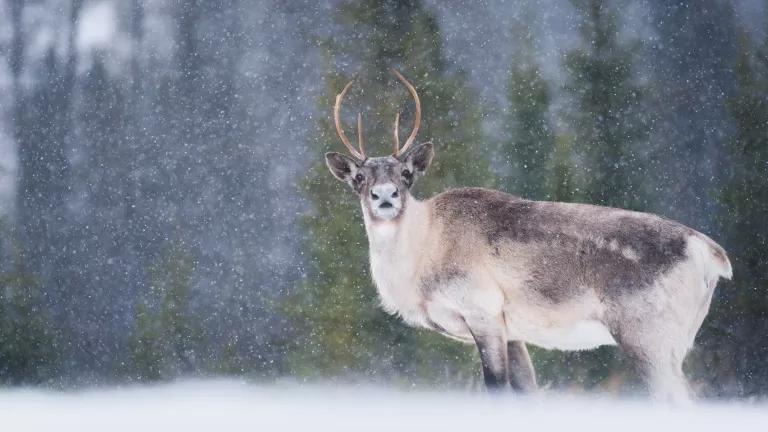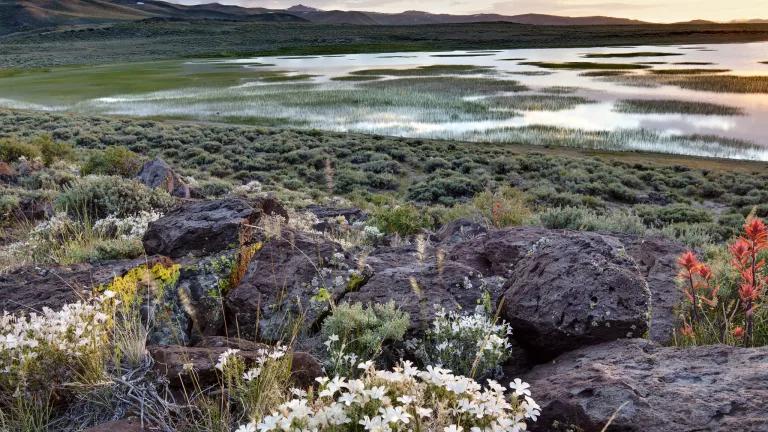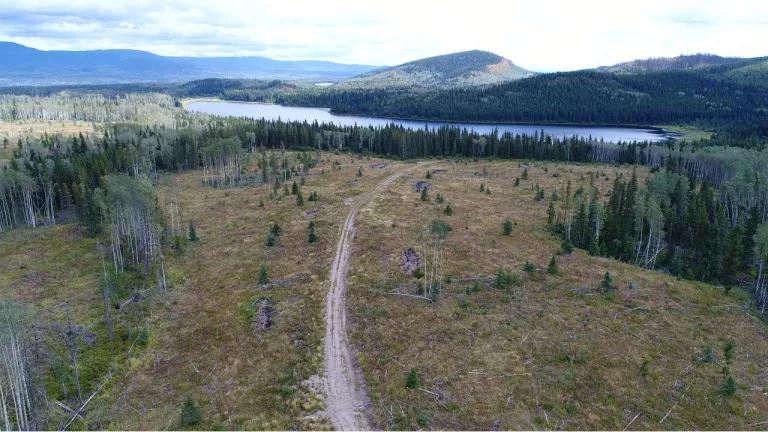Caribou Are Canada’s Reindeer. Canada Is Letting Them Vanish

Caribou in Trouble
Across the continent, millions of children eagerly await the night of December 24, when a team of reindeer are expected to carry Santa Claus across the sky to bestow gifts and joy. In anticipation, images of reindeer adorn gift wrapping, holiday cards, and sweaters. It’s a little known fact that reindeer are classified as the same species as caribou—Rangifer tarandus. Children across the continent, moreover, would be shocked to know that populations of this gentle, majestic species are swiftly declining. This winter, the last caribou to inhabit the contiguous United States will be moved north to Canada, after decades of industrial activity degraded caribou-rich forests which once stretched from Maine to Washington. Yet caribou in Canada are also imperiled. Boreal caribou—the type of caribou that live in Canada’s boreal forest—are threatened by widescale industrial development degrading their forests. Policies have enabled unsustainable logging practices, feeding voracious U.S. demand for wood and pulp products including tissues, toilet paper, and other throwaway items. If caribou are to remain real animals in the wild and not simply fodder for holiday cards, then policymakers, companies and the public will need to take swift and dedicated action to save them.
Why Are Boreal Caribou Disappearing?
In Canada, boreal caribou rely on intact, healthy forests to survive. Yet these forests are being rapidly logged. In recent years, Canada has had the third highest levels of intact forest landscape loss in the world, falling only behind Russia and Brazil. The degradation of these forests leads to rapid boreal caribou population decline, as roads and other disturbances create paths for predators to access vulnerable young calves, and the logging of older boreal trees reduces lichens: a major food source for boreal caribou. While boreal caribou face the loss of their forest habitat, mountain-ranging and migratory caribou also face human-driven pressures including logging, mining, and oil and gas development. Different pressures on distinct caribou ecotypes have led scientists to warn that caribou in Canada are at risk of disappearing forever.
In the boreal forest, caribou decline is extremely alarming to many Indigenous People, who have depended on this species for millennia, and to scientists who consider boreal caribou to be an “umbrella species,” meaning protecting the large intact forests on which they depend simultaneously protects other boreal species. The concept of caribou as forest protectors can also be extended to climate change: large areas of boreal caribou habitat overlay some of the most significant carbon stores of the boreal forest. Scientists have stressed that protecting intact forests is critical in order to keep carbon locked in the ground, and that forest protection can help prevent catastrophic climate change from arriving in the next 12 years. Protecting caribou habitat across Canada’s boreal forest would have benefits far beyond supporting Santa’s favorite ungulate. Protecting them would be a win-win for humanity.
Opportunities Flushed Down the Toilet
Why, then, is Canada enabling the degradation of the boreal forest—one of its most important natural resources—and the decline of its iconic caribou? In part, Canada’s federal and provincial governments are greenlighting logging to feed U.S. demand. The U.S. is the primary destination for boreal forest exports, and American companies are using boreal pulp and wood in their tissue, paper, and a range of other products that are in many cases single-use and destined for toilets and landfills. Some large tissue companies, for example, are so accustomed to this easy access that they use 100% virgin forest fiber in their products. This has a large environmental impact: the Environmental Paper network estimates that producing 100% virgin forest tissue emits more than three times the amount of carbon emissions as 100% recycled tissue. Canada has some of the world’s last large intact wilderness areas in the world, which are critical carbon sinks, yet it’s exporting its forests to be turned into toilet paper.
Forestry in Canada contributes around 1.6% to the country’s GDP, but forestry trade groups wield a lot of political power. Canada’s federal and provincial governments have failed to stand up to powerful industry groups who have resisted safeguards around their activities so vehemently that a recent study compared their efforts to those of fossil fuel industries denying climate change. In Ontario, for example, the province gutted its own Endangered Species Act to give a virtual carte blanche to industry to degrade boreal caribou habitat. Despite having a federal mandate to protect caribou, provinces have refused to implement meaningful protections for these species for decades. Prime Minister Trudeau has faced increased pressure to respond to this provincial inaction with federal caribou habitat protections, yet to date has failed to implement any meaningful safeguards.
Therefore, in addition to pressure for government action, voices in the U.S. and Canada are increasingly calling for systemic changes that avoid a future in which companies turn the world’s last great forests into throwaway products. Consumers in the U.S., for example, can urge large powerful companies to make smarter products that do not require 100% virgin pulp. Countries and companies are shifting to more sustainable models of operating, proving that big changes are possible: countries are running on renewable energy, and more buyers than ever are choosing electric cars. People will likely always depend on forests for goods and services, but those supply chains must be sustainable or we’ll lose those forests, and species that depend on them, forever.
Time for New Year’s Resolutions
Caribou are in trouble, but it’s not too late to save them. In the new year, right around the time of new year’s resolutions, NRDC will be providing guidance on ways the public can make smart purchasing decisions that reduce pressures on the boreal forest and other intact forests. We’ll also provide ways that you can urge powerful companies to use their influence to do good, and not exacerbate global forest loss. If children are to live in a world in which caribou are real and not just adornments on holiday packaging, then policymakers and companies will need to protect this species and their habitat.



